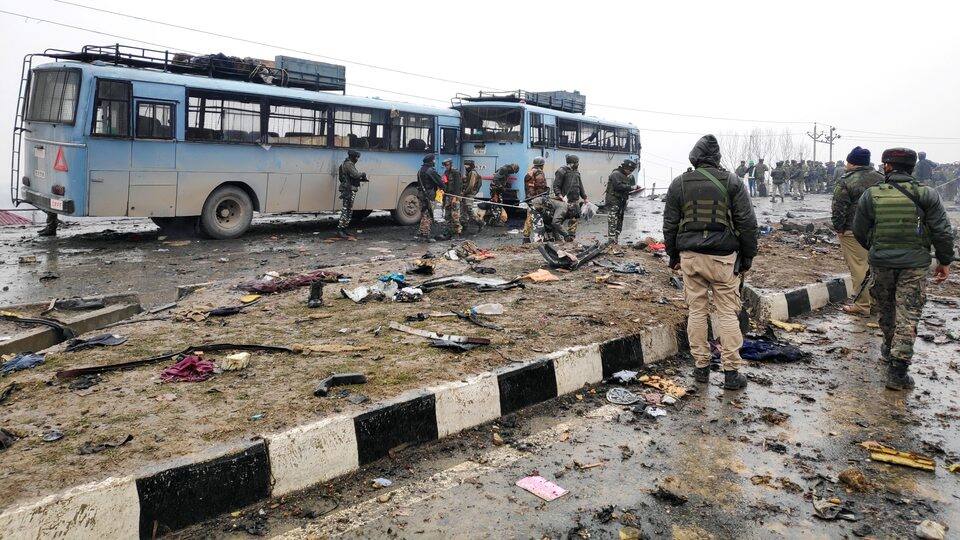
Last week a terrorist belonging to Jaish-e-Mohammed (JeM), a terror outfit promoted by Pakistan and based in that country, carried out a horrific attack through a suicide bomber. It led to the killing of 40 personnel travelling as part of a convoy of the Central Reserve Police Force in south Kashmir. The attack left the nation in shock and in deep mourning, generating unprecedented anger and the demand for retribution. The political responses, from the opposition as well as the Union government, suggest that the playbook on Pakistan, which is already seeing a subtle makeover, is poised for a major reset. On Friday, PM Modi signalled as much to our neighbour when he said this was a new India: defined by nayi neeti (new policy) and nayi reeti (new convention).
Only time will tell as to whether this makeover will generate the desired benefits—of eventually bringing them to the negotiating table to talk peace. But for now, it is clear that India’s neighbour, which is on the threshold of economic bankruptcy, has overplayed its hand of using terrorism as its calling card to stay strategically relevant in the region.
For one, Pakistan has misread the radically altered global circumstances. Its strategy of morphing into a global terror factory has its genesis in the occupation of Afghanistan by the then Soviet Union. The US, in a bid to topple the Soviets, funded Pakistan to create a rival fighting force—who eventually won the war of attrition leading to the withdrawal of the Soviet troops. The Taliban that came to power consequently became a close ally of the Pakistan’s secret service, the Inter-Services Intelligence or ISI. With the US looking away, especially during the 10-year Presidency of Bill Clinton, the ISI became more emboldened and stepped up its operations in Kashmir—a period which lead to the ethnic cleansing of the Kashmiri Hindus from the Valley.
The Americans woke up to the harsh reality of Pakistan’s terror factory when the chickens came home to roost in the form of the 9/11 assault on the World Trade Center in New York by a group of terrorist belonging to the Al-Qaeda—a close affiliate of the ruling Taliban in Afghanistan. An enraged US put Pakistan on notice and unleashed a war which led to the ejection of the Taliban from Afghanistan. Since then the wheel has turned a full circle with the Taliban, thanks to fostering by Pakistan, poised to return to Afghanistan—after the Americans announced a retreat. This is what probably emboldened the ISI to sponsor the attack in Kashmir last week.
But what they have overlooked is that along the way the Americans have all but formally blackballed Pakistan as a terror state. And on Saturday, the Trump administration endorsed India’s right to take steps for self-defence. Effectively, unlike in the past, the Western world is signalling enough is enough and clearing the decks for a muscular response if India so desires.
Second, the Indian establishment has also undergone a makeover as Pakistan-sponsored terrorists have gradually raised the bar. The attacks on the Indian Parliament were followed up by the hijack of the IC 814 from Kathmandu, 26/11 strike on Mumbai and more recently in Pathankot and Uri. Initially, the Indian establishment threatened war together with diplomatic engagement; this was replaced with surgical strikes, both overt and covert. Gradually the Indian response has escalated, especially in the tenure of this government.
Third, Pakistan’s biggest ally, China, finds itself in a corner balancing conflicting interests and may not be in a position to lend the much expected support if the conflict escalates. It has belatedly begun to recognize that it can no longer run with the hare and hunt with the hounds—it has misused its veto power to prevent a United Nations crackdown on the JeM chief even while it is mercilessly targeting Uighur Muslims. Further, China is hurting economically in the backdrop of the US-initiated trade war and a rapidly slowing Chinese economy; moreover some of its rivals, like Japan, are now key allies of India.
Besides China is economically invested in India. The trade turnover between the two countries was $89.7 billion in 2017-18—accounting for 11% of total trade, China is among the top five countries trading with India. And China also recognizes that India’s economic growth will create a multiplier impact on regional economies, which can only mean more export markets for Chinese goods. Normally, money talks.
In the final analysis it is clear that the gloves are coming off in India-Pakistan relations. Pakistan has already lost its veto right over India’s engagement with the rest of the world barring China. The next few months will reveal what else will Pakistan have sacrificed in its pursuit of a zero-sum game.
Anil Padmanabhan is managing editor of Mint and writes every week on the intersection of politics and economics.
Comments are welcome at anil.p@livemint.com